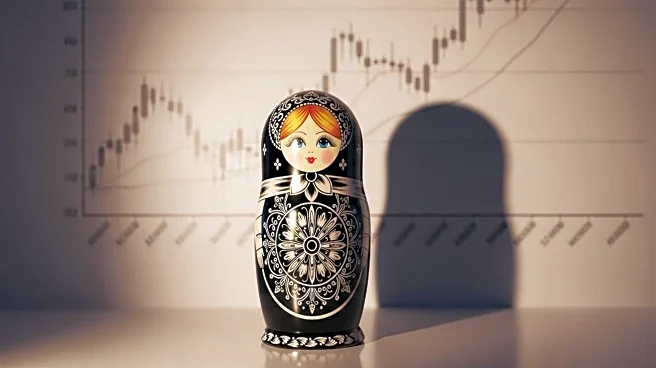What's Happening?
Sberbank CEO German Gref has warned that Russia's economy has entered a phase of 'technical stagnation' during the second quarter of the year. Speaking at the Eastern Economic Forum, Gref highlighted the impact of the Russian Central Bank's tight monetary policy, which he believes could push the country into a recession. The bank's key interest rate, currently at 18%, was previously raised to a two-decade high of 21% in September 2024 to combat inflation driven by military spending. Despite a slight reduction, Gref argues that the rate needs to be lowered to 12% or below for economic recovery. The stagnation is further evidenced by July and August data showing growth nearing zero.
Why It's Important?
The warning from Sberbank's CEO underscores significant challenges facing the Russian economy, particularly the impact of high interest rates on growth. The Central Bank's monetary policy, aimed at controlling inflation, has inadvertently slowed economic activity, raising concerns about a potential recession. This situation is critical as it affects Russia's ability to generate revenue, especially in the context of declining oil and gas exports. The economic stagnation could have broader implications for global energy markets, given Russia's role as a major energy supplier. Additionally, the strain on Russia's state finances, with a budget deficit exceeding targets, highlights the urgency for policy adjustments.
What's Next?
The Russian government is expected to submit new economic forecasts soon, as indicated by Economic Development Minister Maxim Reshetnikov. These forecasts will likely reflect the cooling economy and revised growth projections. Finance Minister Anton Siluanov has already informed President Putin of lowered growth expectations for next year, ranging from 1.2% to 1.5%. The Central Bank may face pressure to further reduce interest rates to stimulate growth, but this will need to be balanced against inflationary concerns. The upcoming speech by President Putin at the Vladivostok forum may provide insights into the government's strategy to address these economic challenges.
Beyond the Headlines
The current economic situation in Russia could lead to long-term shifts in its economic policy and international trade relations. As the country grapples with stagnation, there may be increased focus on diversifying its economy beyond energy exports. This could involve strengthening ties with Asian markets, particularly China, as Europe pivots towards renewable energy sources. The geopolitical implications of Russia's economic challenges may also influence its foreign policy, especially in relation to ongoing conflicts and sanctions.











